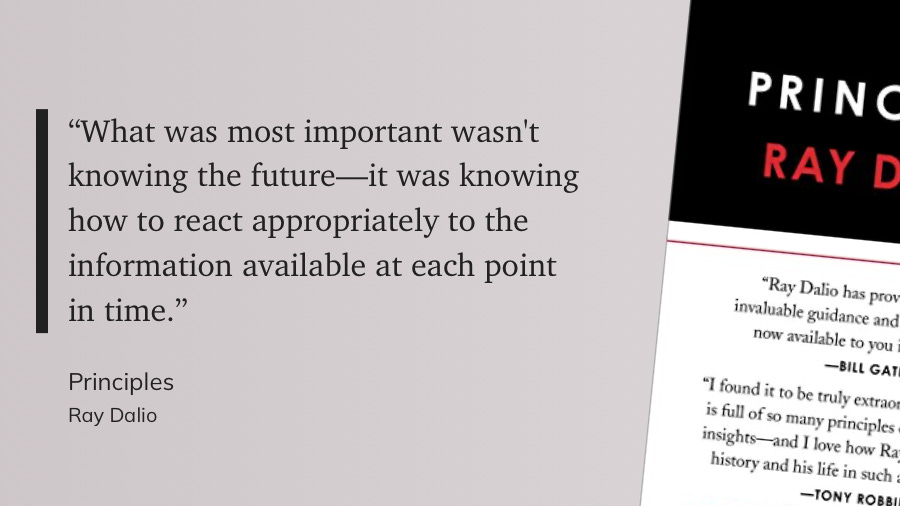Shape of Effective Tactical Execution, TPMs are not middle managers, Asking the Right Question + More...
Welcome to 📮Monday TPM Field Dispatch 003 - Shortform thoughts on tech program management + curated content for further exploration, delivered every Monday to your inbox to kickstart your week.
1️⃣ Shape of Effective Tactical Execution
All grand strategies require effective tactical execution. Being strategic or tactical is not a black white operating mode but a yin and yang mode.
Technical Program Managers execute on strategies therefore we must be masters of tactical execution.
How do you master effective tactical execution? Not by building the perfect and precise program plan.
Great TPMs do not build precise plans; we plan enough to keep the ship focused on the strategic North Star and constantly adjust the minimum required plan.
They know certainty for something that doesn’t not exist (a new product introduction, a never before seen feature, or new membership experience for your fitness app etc) is impossible. Why sell leadership an illusion but are not fools to think that no plan is required.
The effective tactical execution is not to predict the future but to prepare for it.
Find the minimum plan required to kickoff a program (you do not need a full fledged PRD or Gantt chart or project plan to get started).
Keep track of your known risks and weak links (open questions, spikes, POCs, unexplored technologies, lack of design clarity, influx product requirements).
Create clarity through information sharing and sound communication playbook.
Build the right decision making framework (who can make what decisions).
Be reactive where you have to be; Be proactive where you can be.
Above all - leverage milestones, gates, heartbeat checks to know when you must adjust the plan (nothing is written in stone; its all fluid aka agile 😉 ).
2️⃣ Hot Take: Technical Program Managers are not middle management
Shopify announced a 20% layoff across all their units; underlying goal - flatter organization. Prior to that, Meta did the same - Year of Efficiency. Give crafters back the decision making powers. Get rid of excess middle management.
Modern Technical Program Managers are not middle management. They are for me the linch pins of flat organizations or what I refer to as Auxiliary Management.
Management implies two powers:
People management
Decision making powers
TPMs have neither; we are leaders without authority.
TPMs are the glue that holds cross-functional teams together especially when the challenge is not a simple project but many large changes coming together to effect once massive organizational shift (think: new product launch, the 1st version of the iOS HomeKit App, revamping your entire user consent management system, make two factor auth default for the entire iCloud population).
You can decentralize decision making and bring accountability closer to front line engineers however, you still need an entity that is cutting across both business, design, and technology organizations to ensure the strategic program is still executing to the desired outcome, building trust, and ensure teams have what they need to stay focused and operate at the optimal levels.
Further Reading: Meta is Flattening the Organization: A Bold Move or Misguided Attempt?
3️⃣ Learning to ask the right question
In humanities, all modern knowledge is built on the foundation of classical knowledge.
Same is true in engineering and product development. I enjoy reading and consuming modern takes, thoughts, and ideas but sometimes I go back to the classics to find not answers but the right questions to ask.
Fred Brooks Mythical Man Month is an example of a forever classic that I read often; my bible on technical project management.
Great TPMs know the right question to ask and the right question is always what keeps the conversation moving forward.
What question will lead to us to finding the missing dependency that may risk the project before its critical milestone?
What question will lead us to refine our requirement to something more executable?
What question will lead these opposing arguments to find alignment towards a single direction?
What question will lead us to the next steps for this missed deadline?
What question will allow me to further my understanding of this technical architecture we are building?
What question will improve our confidence in the current plan?
What question will lead me to be prepared for the inquires from senior leadership?
What classic am I reading these days? Software Engineering Economics by Barry W. Boehm published in 1981.
4️⃣ My Cohort Course Is Open For Enrollment + What People Are Saying
My course on what it takes to be a Great Technical Program Manager is open for enrollment on maven.
Timing: May 30th, 9AM to 12PM PST.
🚨 Spots are limited, click the button below for the course page with details and to enroll.
I have been floored by the response especially from folks on LinkedIn. The love from James Wilson (Chief Digital Technology Officer @ WoolsieX and my ex-compatriot from Apple where we did some crazy programs), Shannon Vettes (Former Head of Program at BlaBlacar, phenomenal product and engineering leader), Jose Cong (Head of Talent at Humane and the most extraordinary talent acquisition, career coach and team builder I have ever met) left me in tears.
But, I was left speechless when John Cutler shared my announcement. I think I died when I saw this, completely blindsided me in an amazingly great way 😊.
If you know someone who might be interested in attending this course, please share the course page with them. 🙇 🙏
How was this week’s newsletter?
If you enjoy and love reading what I write, perhaps you know someone who could also enjoy and love reading these essays and dispatches. Share this with your friends and colleagues and lets grow together. 🙏 ☺️ ❤️
You can suggest topics or questions for me to write about in the future. It could be something you are curious about or maybe something you're struggling with right now.




